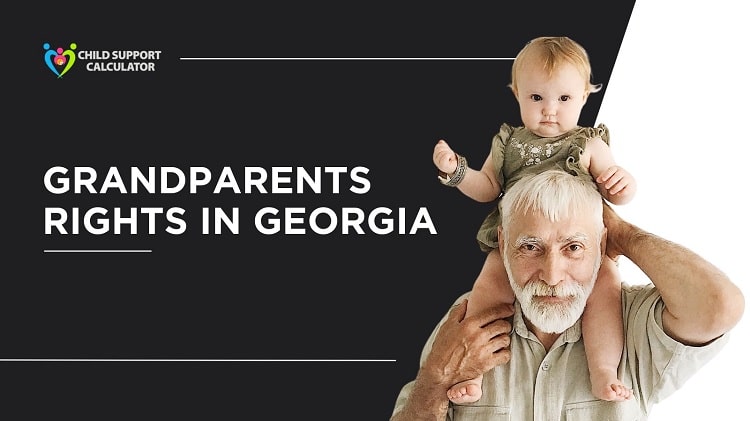Grandparents Rights In Kentucky (Updated) 2024
Grandparent visitation rights can be granted to grandparents in KY if it is in the “best interest of the child,” according to the state’s grandparent visitation statute. But, in practice, what does that imply? Despite the fact that this Act has not been changed since 1996, it has been read and used in a variety of ways over the years, influenced by precedents created by local and national cases.

As a result, Kentucky is believed to be a typically tolerant state when it comes to grandparents’ rights. In KY, the phrase “best interests of the child” are interpreted variably depending on the situation, but it has tended to benefit grandparents.
Divorce, separation, or the death of one parent can all have a negative impact on grandparents’ relationships with their grandchildren. This article explains grandparents rights in Kentucky.
Grandparent Visitation Rights In Kentucky
Despite the fact that Kentucky law appears to be shifting in favor of grandparents rights in Kentucky, the grandparents still bear the burden of proof in demonstrating the child’s ‘best interest.’ The court may examine the following factors when assessing what is in the best interest of the child:
- The quality of your relationship with the child, as well as the quantity of time you spend with.
- The proposed visits’ potential benefits and drawbacks.
- The effect of court-ordered visitation on the relationship between the parents and their children.
- Everyone’s physical and mental well-being is at stake.
- The need for stability in the life of a child.
- The wishes and preferences of the child
The rights of grandparents are influenced by these and other considerations. It’s also worth considering parental rights and how they affect grandparents’ rights. If a grandparent’s kid loses parental rights in Kentucky, the grandparent’s visitation rights do not automatically end. If your grandchild is adopted after you have been granted visiting time with the kid, for example, the adoption will not automatically terminate your visitation privileges.
Grandparent Custody Rights In Kentucky
The child’s best interests are considered in a custody case in Kentucky, just as they are in a visiting case. The court may also take into account the following factors when making its decision:
- Wishes to the parents.
- The wishes of the child.
- The child’s relationship with his or her parents, siblings, and any family members who are actively involved.
- The child’s adaptation to their current surroundings (s).
- Everyone’s mental and physical well-being is at stake.
- If you have a history of domestic abuse, tell us about it.
- The reasons why the kid was placed in the care of a “de facto” parent
Unless the kid’s parent(s) demonstrate a reasonable reason for temporarily placing the child in your care, you can obtain custody of the child who is already living with you, and you are the child’s principal caregiver and financial supporter. Domestic violence, looking for work, or going to school are examples of such reasons.
Termination Of Grandparents Rights In Kentucky
Even if the parent’s rights are terminated once the child is placed for adoption, the court’s orders allow grandparent visits remain in effect. As a result, if your grandchild is adopted after you have been granted time with the kid, your grandparents rights in Kentucky will not be immediately terminated.
If your grandchild is adopted before you have been granted court-ordered time with him or her, your right to request visits will be passed to the adoptive grandparents unless a judge determines that keeping your ties to the child is in the best interests of the child.
Can a grandparent take custody of a mother?
Your own child may not always be the best parent. This could be due to the effect of addiction or mental illness on your child’s ability to parent. If there is a risk of injury, especially if it is imminent, it may be necessary to contact Child Safety Services (Department of Communities).
If the harm is not immediate, you may be able to bring an application to the Family Court or the Federal Circuit Court, requesting that the court make an order allowing your grandchild to reside with you. Taking this step can be challenging on an emotional level because you’ll have to show the court how your own child is failing to care for your grandchildren properly.
Faqs
Grandparents in Kentucky have the legal right to reasonable visitation with their grandchildren at any time, whether before or after divorce, separation, or the death of one parent.
In the county where your grandchild lives, you must file a letter with the local district court. If you have filed a form and received a visitation order, but the kid’s parent is refusing to allow you to see your child, you can urge the court to enforce an order. However, you must submit a new petition.
Grandparents in Kentucky have the right to request visitation with their grandchildren at any time. The court will make a decision based on the child’s or children’s best interests. In KY, laws protecting grandparents’ rights have been in existence for nearly three decades.
“The kid has a right to spend time with and communicate with persons who are important to their care, welfare, and development – including grandparents – on a frequent basis unless doing so would be detrimental to the child’s best interests.”
As a result, while grandparents do not have an explicit right to retain contact with their grandchildren, grandchildren do have the right to maintain contact with their grandparents. This right, among others, is taken into account when a court order is sought to include or exclude a grandmother from a child’s life.
Parties who are subject to a consent order or a parental order are legally bound to follow it. The courts can be used by an aggrieved party to enforce the penalties of non-compliance. Failure to obey the order, making no attempt to obey the order, or if a third party (such as a parent’s new partner) comes in the way of the order are all examples of non-compliance.
You may be eligible for child support if you provide at least 35% of your grandchildren’s care. The child support agency calculates the amount of care you have for your grandchildren based on the number of nights the children are scheduled to spend with you over the next 12 months. The number of nights is then divided by the number of days in the year to get a percentage.
If a grandparent refuses to return your child after a visit, you might want to consider restricting their access for their own safety. When a parent denies a grandparent visitation, the law presumes that they are acting in their child’s best interests.







